Crude Conversations
”Crude Conversations” features guests who represent a different aspect of Alaska. Follow along as host Cody Liska takes a contemporary look at what it means to be an Alaskan. Support and subscribe at www.patreon.com/crudemagazine and www.buymeacoffee.com/crudemagazine
Episodes
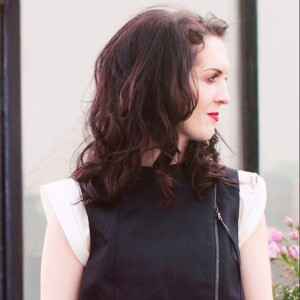
Saturday Jun 17, 2023
Saturday Jun 17, 2023
Mary Mattingly is an interdisciplinary artist who builds sculptural ecosystems that address human consumption and resilience, with an underlying theme of how they might play into our ability to preserve through catastrophic events. Two of her past projects — Waterpod and Swale — were barges that periodically docked in certain areas of New York City. Both depended on a level of nomadism and self-sufficiency. She describes Waterpod as a self-sufficient living space on the water that was a shelter, grew its own food, cleaned its own water and was also a space where she could make artwork. Swale came next. It was an edible landscape and it applied many of the skills she’d learned from Waterpod. Things like navigating a large vessel though city waterways and how foraging for fresh foods could work in a city with so many rules and regulations.
Her artwork always comes from a personal place. In 2008, after numerous surgeries and trips to the hospital, she was diagnosed with Celiac disease. It was a painful journey. For so long, she didn’t know what was wrong with her. So, the diagnosis was a relief. She finally had a word to attach to what she was experiencing. That’s when she became interested in food. Specifically, she became aware of the inaccessibility to fresh foods — how expensive they are and how many rules and regulations prohibit people from growing their own food in public spaces. At one point, she learned about how a community garden had been shut down due to a real estate development. That was when she realized that spaces like that weren’t protected and could be easily taken away.
Her interest in the idea of consumption and resilience goes back to her childhood, when she didn’t always have the things she wanted. She was born in Rockville, Connecticut, but she grew up in Summersville. Both are small towns that are close to nature. She tells this story about how, when she was a kid, she and her siblings would make a game out of running as fast as they could to reach a neighbor’s barn before he let off a warning shot. So, when she moved to New York City, where manmade structures dominate the landscape and overconsumption is common, she began to think about how that affects us, how being so reliant on outside inputs can deprive us of our independence. The sheer scale of the trash cycle in New York City, for example, devastated her. Three nights a week, she would see trash piled up on the sidewalks, sometimes taller than her.
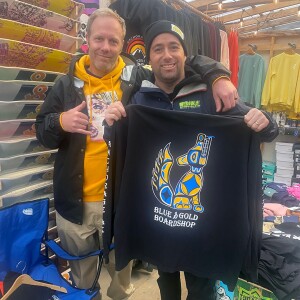
Sunday Jun 11, 2023
EP 133 The story of JB Deuce with Jason Borgstede and Jesse Burtner
Sunday Jun 11, 2023
Sunday Jun 11, 2023
In this one, Cody talks to Jesse Burtner and Jason Borgstede about JB Deuce, the name they produced the Boarderline snow and skate videos under. Over seven videos, they featured snowboarders and skateboarders from Alaska, local kids who were passionate about getting clips and being part of the snow and skate community. Some would spend all season getting shots so they could have a full part, others would get one or two solid clips that went into the friends’ section. The idea was to include as many people in the video as possible because, at its core, it was a local video that uplifted its scene.
The video premieres became a cultural phenomenon. The first three premieres were at the Dimond Center Mall, just right outside of Boarderline Snow and Skate. Jason and Jesse would rent a projector and a screen from Karl’s Action Video and set up chairs. It was modest — in fact, the first video, Polar Bears, Dogsleds and Igloos was edited at Chugiak High School with the help of one of their former teachers — but the videos would soon grow into something they could have never imagined. Jesse remembers people trying to shove money into his hand at one premiere because it was sold out and they didn’t have tickets. Jason remembers the Boarderline team showing up to a premiere in a motorhome and walking a red carpet. Both of those situations were at the 4th Avenue Theatre, where hundreds of people came to watch the season-long efforts of local skaters and local snowboarders.
Jason and Jesse say that Cody's dad, Scott Liska, was integral to JB Deuce. They helped film and produce the video and Boarderline sponsored it, but it became known as the Boarderline video. For the first one, he wrote a $10,000 check. He wanted it to be good and good things are rarely cheap. So, that’s how it went — Scott would pay for the cost of the video and Jason and Jesse would spend every free minute they had creating it. It was a labor of love, camaraderie and commitment. There was a shared mentality of humor and seriousness that the videos exemplified. It was in the skating and in the snowboarding, but it was also in the names of the videos: Northern Exposure, 100%, Survival of the Tightest, The 49th Chamber, In For Life and Steezin’ For No Reason.
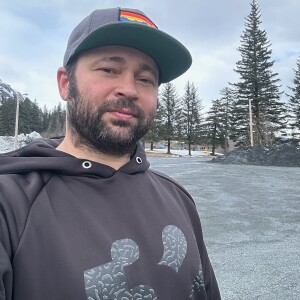
Sunday May 28, 2023
EP 132 Did Darian Draper land the first double-cork in snowboarding?
Sunday May 28, 2023
Sunday May 28, 2023
In this one, Cody talks to Darian Draper. He’s a snowboarder, a father and an all-around athlete. He grew up in Seward, Alaska, where he learned how to be an athlete and the importance of working out and preparing for competition. He wrestled in high school and won the Alaska small state championship of wrestling twice. He was a take-down artist, meaning he would rush his opponent and subdue them on the ground as quickly as possible. He says he probably could’ve gone to college for wrestling, but he was more interested in snowboarding. So, that’s what he did, he refocused all of his energy into getting good at snowboarding. He’d watch all the new videos and then practice those tricks on the trampoline with his brother. He and his friends would eventually hike around the mountains surrounding Seward and build jumps, they’d go to Turnagain Pass to build jumps there too, and at the end of the season they’d go to Boarderline Camp at Alyeska. Darian applied the same mentality to snowboarding as he did wrestling. He studied and trained because that’s how you get good.
His first board sponsor was Nitro Snowboards and his team manager considered him a jock. And not in a positive, this-guy’s-an-athlete-and-we-need-to-promote-him kind of way. Instead, it was in a way that made him hold Darian’s snowboard career back. When Darian landed what many consider to be the first double cork, or a precursor to a double cork, the team manager bought the rights to the photo sequence and suppressed it so that it would never come out. Then when Darian asked him why he never ran the sequence, he said he didn’t want him to be labeled as a hucker, someone who indiscriminately chucks their body into the air. This was in 2001, when no one was really doing tricks like that. These tricks would eventually become a staple in professional snowboarding. Darian still feels like he got ripped off on that one, but he’s got kids now and says that that’s helped him learn how to let things go and to not live in the past.
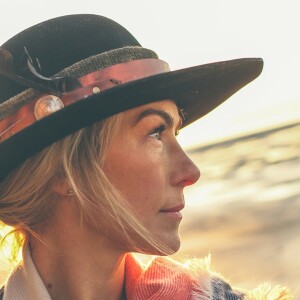
Sunday May 14, 2023
EP 131 All or nothing with Rosey Fletcher
Sunday May 14, 2023
Sunday May 14, 2023
In this one, Cody talks to former Olympian Rosey Fletcher. Rosey grew up in Girdwood, Alaska, and remembers having an unconditional love for snowboarding. The riding, the friendships and the competition. There was nothing she wanted to do more and she had aspirations of being the best. So, she worked three jobs to pay for her coaching lessons — the video store in Girdwood, The Bakeshop and a little restaurant in Bird Creek. As she got better at snowboarding and at competing, she started winning local competitions. Then, when she started winning those local competitions, she was invited to national competitions. When she started winning those, she was invited to competitions where she competed against the best in the world.
She competed for 15 years, from her late teens into adulthood. In that time, she reached the podium locally, nationally and globally. She received silver medals at the World Championships, World Cup gold medals, and a Bronze medal in the 2006 Winter Olympics. That same year — in 2006, at the Olympics — she made a decision to leave the world of competitive snowboarding. It was a quiet exit. She didn’t make a big deal out of it and she didn’t tell anyone. Instead, she savored everything about the experience — the stops at ski resorts, the hotels, the people she met and her fellow competitors. To this day, she doesn’t regret her decision to leave because she accomplished what she set out to accomplish.
She says that her strongest attribute is her perseverance. How whenever she’s faced with life’s obstacles, she keeps going. When she left the competitive snowboard scene, for example, she jokes that she didn’t have any life skills and that she barely knew how to boil water. So, she made a point of learning how to cook. Now, she loves everything about the process of cooking, down to the meditative practice of preparing the food. That same passion goes into her work as a health and wellness instructor. She approaches it like an athlete. She only gets an hour with her clients and she intends to use that time to its full potential.
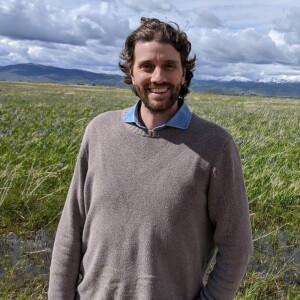
Friday May 05, 2023
Chatter Marks EP 62 Alaska history from the bottom up with Ian Hartman
Friday May 05, 2023
Friday May 05, 2023
Historian Ian Hartman is an Associate Professor and Department Chair at the University of Alaska Anchorage. He teaches history from the bottom up, meaning he looks for how regular, working class people have been agents of change throughout history. This is the opposite of how so much of history has been recorded, which has looked at it through the perspective of The Great Man Theory. The Great Man Theory, as it relates to history, looks at leaders and other perceived great men as heroes and the sole agents of change. Ian points to the Civil Rights movement and the general cultural upheavals of the 1960s and 1970s for shifting our understanding of history.
Ian is also a public historian known, most recently, for his work on the history of the Alaska Railroad and a book he co-authored with Alaska public historian David Reamer about the history of the black experience in Alaska. The book, Black Lives in Alaska: A History of African Americans in the Far Northwest, details how Black men and women have participated in Alaska's politics and culture since before statehood. How Black history in Alaska is almost by default a history of the bottom up. It’s a history that involves racial discrimination, but also involves people mobilizing themselves in the face of that discrimination. How they were, and are, agents who are capable of forging social movements and solidarity. They rose up and involved themselves in the workings of the state.
His work on the Alaska Railroad will soon be on display — along with the work of other experts — at an Anchorage Museum exhibition titled All Aboard: The Alaska Railroad Centennial. The exhibition highlights crucial moments, technological innovations and human stories connected to the railroad and its operations in Alaska. An interesting fact about the people who originally worked on the Alaska Railroad is that the majority of them came from Alaska. They were already in the state working the Klondike Gold Rush and, when that ended, workers — who were generally young, single men — found more work helping to construct the railroad.
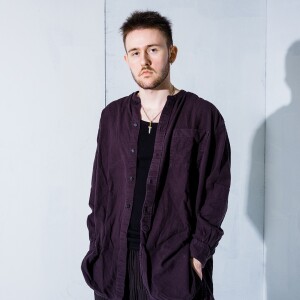
Wednesday Apr 26, 2023
EP 130 Being authentic and a fear of forgetting with Zane Penny
Wednesday Apr 26, 2023
Wednesday Apr 26, 2023
In this episode, Cody talks to musician Zane Penny. He says that every creative endeavor he’s been involved in has led him to where he is right now. It goes back to 5th grade, when his mom heard about an audition for a short film. Zane was interested, but he’d never acted before, so he was nervous. So nervous, and full of doubt, that he almost skipped the audition all together. But then, at the last minute, he decided to go. Everything else has flowed from that moment. More acting gigs, filmmaking, creating music and joining Vitus Collective, a group of young musicians and artists based in Anchorage.
Joining Vitus Collective was an important milestone for Zane. It introduced him to a group of likeminded youth and it also helped him realize the importance of young artists, that their message and their perspective matters. There was a problem though, there was nowhere for them to perform. So, in high school, Vitus began hosting all ages shows. These shows were a success, at times bringing in around 300 people. Reflecting on it now, Zane says that when kids have the opportunity to support their friends, they show up.
A big part of the music, for him, is the fashion that goes along with it. When he was younger, he wore clothes that made him stand out — a hood with bunny ears, tank tops and metal chokers. He looks back on those choices now and he laughs, but he understands that that was his way of expressing himself back then. In fact, he keeps a lot of those clothes around his house to remind himself of where he comes from. The clothes, and other pieces of his past, help him fight his fear of forgetting. This fear of waking up one day and realizing that the world has gone on without him. Everything is different, but he’s the same. He thinks this fear stems from some of his family’s issues involving alcoholism. So, in general, he stays away from alcohol, and instead focuses on the thing that helps quiet that fear, his music.
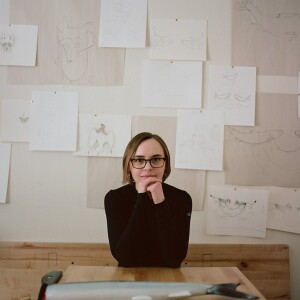
Sunday Apr 16, 2023
Chatter Marks EP 60 Little, wild places with Erin Ggaadimits Ivalu Gingrich
Sunday Apr 16, 2023
Sunday Apr 16, 2023
Interdisciplinary artist Erin Ggaadimits Ivalu Gingrich grew up in Galena, Alaska, a place that continues to have an impact on her art. You can see it in her beadwork and the masks and sculptures she creates. They represent — among other things — birds, berries, caribou, seals and fish. In fact, when she thinks back on her childhood in Galena, fish are a big part of her memories. She remembers watching them being caught in fish wheels and by people along the Yukon River. She also remembers being told to be mindful of the river because of what it is — this thing of nature that brings bounty, but can also bring destruction if you’re not careful around it. Overall, she remembers the sense of freedom she felt growing up in such a rural place, being one with nature and with wildlife.
She lives in Anchorage now and talks about the importance of little, wild places. How Alaska is known for its size and its scale — its large, open spaces occupied by trees, grass, mountains and wildlife — but little patches of wilderness are important too. They can be an untamed patch of grass that grows on the sidewalk or a lake in the middle of town. Anything that brings you back to the earth, back to being one with a natural environment.
When Erin thinks about being one with her natural environment, she doesn’t recall one single image. She recalls moments and sounds that create a feeling — like running water or fishing in the rain with her mom. Thinking about this one morning when she and her mom were out dipnetting on the Kasilof River and it was pitch black, there were seals fishing in the water, it was raining and they could see dark clouds on the horizon and an incoming thunderstorm. She says that she felt in-community with the natural elements around her — with the seals and with all the other people who were out fishing.
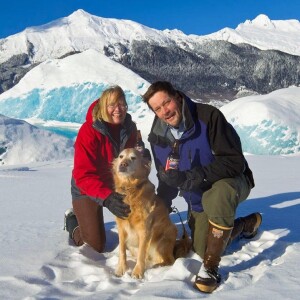
Sunday Apr 09, 2023
EP 129 A leap of faith with Geoff and Marcy Larson of Alaskan Brewing
Sunday Apr 09, 2023
Sunday Apr 09, 2023
In this one, Cody talks to Geoff and Marcy Larson of Alaskan Brewing. Geoff and Marcy opened the brewery in 1986. Back then, Geoff says that craft beer was a novel idea — only a fraction of beers that were consumed were craft beers. He says that, altogether, there were probably only 100 breweries in the entire country. So, there was a lot of education involved in those early days — learning about the craft of brewing and also teaching it to others. But before they could focus on the beer, they needed to raise money for the whole operation. Both of them come from families that have rocky relationships with alcohol — both have lost family members because of it. So, they knew their families wouldn’t really like the idea of them starting a brewery. So, they needed to find investors. 88 small investors became integral to the start-up of Alaskan Brewing. Of those original investors, around 63 are still involved.
From the beginning, they wanted their beer to represent Alaska. To be something Alaskans were proud of and that accurately represented the state to the rest of the beer-drinking world. Many times, they’ve gotten ideas for graphics and for brewing from their time in nature and from being around other Alaskans. For example, they have a cabin in Gustavus where they go to relax. And with help from residents of the town, it’s also where they harvest the spruce tips they use in their beer.
They're both adamant about how lucky they are and about how much help they’ve had along the way. Marcy says that the fishing fleet in Juneau was largely responsible for introducing their beer to people outside of Alaska because after they were done commercial fishing for the season, they would spend their winters in cities like Seattle. They’d pack up all the Alaskan beer they could fit on their boats, head south and then share it with their friends and families. To this day, it’s still surprising for Geoff and Marcy to see one of their beers outside of Alaska, in the hands of someone they don’t know.
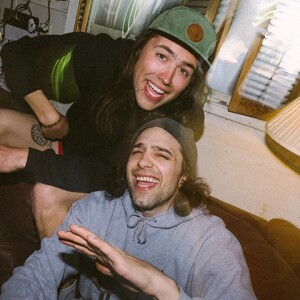
Thursday Mar 30, 2023
Thursday Mar 30, 2023
In this one, Cody talks to brothers Garrett and Jake Swenson of the hip hop group Brother Buffalo. They’re of Eyak heritage, with roots in Cordova, Alaska, but they grew up in Anchorage. As far as their understanding of their heritage goes, they didn’t have much to go on because so much of the culture was taken from their people and documentation of it was either destroyed or spread across a number of museums. So, it was hard for them to figure out what being Eyak actually meant. Their connection to their past was limited and their access to generational stories were few. One connection they remember, though, was having traditional headbands that they’d wear to weddings and to special get-togethers. But then, in 2008, after Chief Marie Smith passed away, the language was declared dead. She was the last fluent Eyak language speaker.
In the last 5 to 10 years, the Eyak language has made a comeback. For their part, Garrett and Jake are learning the language and using it in their raps. They’ve been taking language classes for a few years now. The group meets once every two weeks, learning and practicing the language. In these meetings, Garrett and Jake say they’re learning more about themselves and their people. For them, the whole thing — understanding their culture and creating their music — is about self-realization and reclamation. They call their sound Inlet Music because that’s where they grew up — in Anchorage, surrounded by the Cook Inlet. Except for they don’t acknowledge the Captain Cook part of Cook Inlet because of what it represents — colonialism and erasure. That’s why they named their most recent album “Our Inlet.” It’s a reclamation of what was taken.
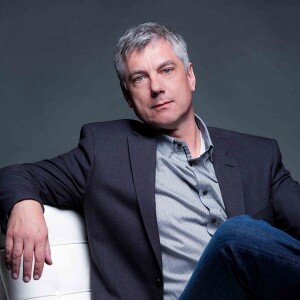
Sunday Mar 12, 2023
Sunday Mar 12, 2023
In this one, Cody talks to former homicide detective Glen Klinkhart. In 1981, Glen’s older sister was sexually assaulted and murdered at their home in Anchorage, Alaska. She had thrown a party at her house and after everyone left, a nineteen year old classmate returned. To cover up his crime, he burned down their house. He was later caught and sentenced to 75 years in prison.
Glen says that we can intellectualize why people commit heinous crimes as much as we want to, but the reason is ultimately very simple: People do it because they want to. Now, that choice might be corrupted by other things like anger, deviancy, mental illness or drugs, but at the end of the day it’s a conscious choice. The outcome of which is devastating to all those it affects. He says that, so often, the crime perpetrated on someone becomes their identity. It becomes all consuming and can result in a lifetime of guilt and bitterness. But recently, Glen has found ways to let go of those feelings. One of them is digitizing all of his dad’s 35 mm slides. He’s going through so many family photos and it’s giving him the opportunity to see his sister through a whole new lens, as the beautiful young woman she was.
Years ago, Glen was teaching a homicide class and one of his students asked him if having a murdered sister made him a better detective or did it make the job more difficult. He’d never thought about it before that moment, but he’ll always remember his response. He said, “You don’t have to have a murdered sister to be a good homicide detective, but it helps.” That became the first sentence in his true crime memoir, “Finding Bethany.” The book details his upbringing all the way to him becoming a detective for the Anchorage Police Department, with a focus on finding a young woman named Bethany Correira. He says that, in addition to his sense of duty to her and her family, working Bethany’s case — a case that had so many similarities to his sister’s — also helped him process his sister’s murder.





